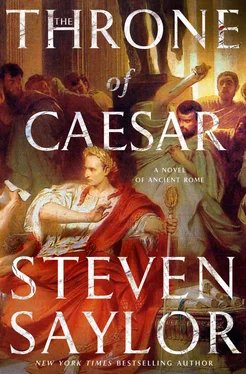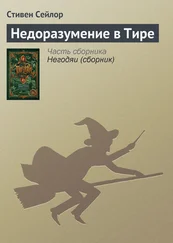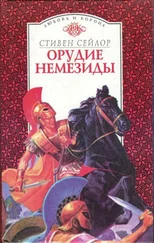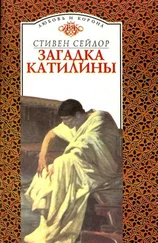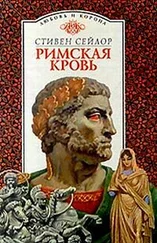Стивен Сейлор - The Throne of Caesar
Здесь есть возможность читать онлайн «Стивен Сейлор - The Throne of Caesar» весь текст электронной книги совершенно бесплатно (целиком полную версию без сокращений). В некоторых случаях можно слушать аудио, скачать через торрент в формате fb2 и присутствует краткое содержание. Год выпуска: 2018, Издательство: St. Martin's Press, Жанр: Исторический детектив, на английском языке. Описание произведения, (предисловие) а так же отзывы посетителей доступны на портале библиотеки ЛибКат.
- Название:The Throne of Caesar
- Автор:
- Издательство:St. Martin's Press
- Жанр:
- Год:2018
- ISBN:нет данных
- Рейтинг книги:5 / 5. Голосов: 1
-
Избранное:Добавить в избранное
- Отзывы:
-
Ваша оценка:
- 100
- 1
- 2
- 3
- 4
- 5
The Throne of Caesar: краткое содержание, описание и аннотация
Предлагаем к чтению аннотацию, описание, краткое содержание или предисловие (зависит от того, что написал сам автор книги «The Throne of Caesar»). Если вы не нашли необходимую информацию о книге — напишите в комментариях, мы постараемся отыскать её.
The Throne of Caesar — читать онлайн бесплатно полную книгу (весь текст) целиком
Ниже представлен текст книги, разбитый по страницам. Система сохранения места последней прочитанной страницы, позволяет с удобством читать онлайн бесплатно книгу «The Throne of Caesar», без необходимости каждый раз заново искать на чём Вы остановились. Поставьте закладку, и сможете в любой момент перейти на страницу, на которой закончили чтение.
Интервал:
Закладка:
“I don’t intend to. I know where that shop is located, on a street with a number of other very exclusive establishments—including the most prestigious bookseller in Rome. I shall buy the Zmyrna as a gift for you, and you shall read it tonight.”
“Nonsense, I can buy it for myself.”
“Don’t be ungracious, Papa.” This came from Diana, who happened to be passing by the doorway and paused to look in. “You’re so hard to shop for—the man who wants for nothing because he wants nothing. If Meto knows of a book you might like, by all means, let him have the pleasure of purchasing it for you. What’s the title? I’m not sure I heard it correctly.”
“ Zmyrna, a very famous poem by Papa’s drinking companion, Cinna. Have you heard of it?”
“With two children and a husband to look after, I have even less time for poetry than father does. Perhaps you can read it aloud to me, Papa.”
“Or perhaps not,” I said, “considering the subject matter.”
“Which is?”
“Never mind. Shall we be off, Meto? We have shopping to do.”
XIX
If there had ever been any ironmongers on the Street of the Ironmongers, they had departed long ago, driven out by rising rents. The street was just off the Forum, on the Subura side, the Subura being Rome’s most crowded, dirtiest, and most dangerous neighborhood. Some speculator in real estate realized that if one walled off the north end of the street, so that it no longer opened to the Subura, the Street of the Ironmongers could be entered only from the Forum. The wall was erected, and gone now were the petty thieves, drunkards, and beggars who could no longer scuttle off into the wilds of the Subura at a moment’s notice. Taking their place were muscle-bound slaves who loitered in the street, trying to look inconspicuous as they kept an eye on the clientele and guarded the expensive goods of their masters.
I had intended to visit the tailor first, to be done with my toga shopping, but Meto was so eager to acquire the Zmyrna that I allowed him to lead me straight to a bookseller at the very end of the street, next to the wall.
The shop smelled of ink and papyrus and wood shavings. Pigeonhole shelves along the walls were stuffed with scrolls. Some were merely rolled and tied with ribbons, but others were wound around dowels with handles made of wood or ivory.
“Ivory rollers for books!” I muttered. “Who could afford such a luxury? What words could justify the expense?”
“Ivory handles speak less about the book and more the man purchasing the book,” said a wizened little man behind the counter. His keen eyes peered out of a wrinkled face that terminated in a huge beard not quite as gray as my own. I had reached the age where many an elderly fellow I encountered was not yet as elderly as myself.
“I’m Simonides, the proprietor of this shop,” he said. “We offer books suitable for every reader and every level of wealth. Books for old or young, books for men of all sorts, and even books for women. As you noted, we supply ivory handles, wooden handles, or no handles at all; bring your own rollers and we’ll mount the scroll for you. We also offer the fastest and most accurate copying service in Rome. Small jobs like letters or love poems can be done while you wait.” He gestured to an open door behind him, through which I could see a number of scribes bent over small tables. The scratching of styluses across papyrus made a quiet but steady rasping noise.
“We’re looking for a particular book,” said Meto. “A poem.”
“Yes?” said Simonides. “We handle all the finest poets, both Latin and Greek.”
“The Zmyrna of Helvius Cinna.”
“Oh!” exclaimed the little man. “What a wise choice you made when you chose to visit the bookshop of Simonides! This happens to be the only place in Rome where discriminating readers can purchase a copy of the Zmyrna . We are the exclusive copyists for the works of Helvius Cinna.”
“Is that a fact?” I said.
“It is.”
“I should have thought a poet would want his words to be distributed as widely as possible, available in every bookshop.”
“Some poets, perhaps,” the little man said sourly, “and all the polit icians, that’s for sure—they want everyone everywhere to read every word of their memoirs. Some of those books I can’t give away.”
I glanced at Meto. Before he could ask if the bookseller had a copy of Caesar’s Civil Wars, I steered the conversation back to Cinna. “But you do have a copy of the Zmyrna ?”
“I’ll have to check,” Simonides said thoughtfully. “As I was saying, some poets would hawk their wares on every street corner in the Subura, but Cinna is quite the opposite. His work is so refined, so complex, it’s really accessible only to the keenest intellects.”
“I’ve been told that Cicero thinks Cinna makes a lot of sound but not much sense.”
“The sound of Cinna—well, yes, it’s ravishing, isn’t it? To hear those words read aloud is to succumb to a kind of music, to a song like the sirens sang. As for making sense, before Cicero dares to critique a work by Cinna, he might wish to expand his own vocabulary and reacquaint himself with some of the lesser-known but no less potent myths. Jupiter knows what Cicero will make of Cinna’s forthcoming poem.”
“There’s to be a new poem by Cinna?” I asked, curious to hear what the bookseller knew about it.
“Indeed, there is!” Simonides lowered his voice and gave us a conspiratorial look. “Rumor has it that this new work will eclipse even the Zmyrna. The poet drops by this shop from time to time, and has on occasion uttered a line or two from the forthcoming poem, teasing me, as it were—each line sublime in itself, so that one can only imagine the exalted magnitude of the complete poem.”
“Something about Orpheus, isn’t it? And Pentheus?” I said innocently.
Simonides gave me a blank look. “Is it? Cinna never told me that. He’s always very guarded about the subject matter, says he doesn’t want some other poet to overhear and steal his idea.” He cocked his head. “Who did you say you are?”
“Apologies,” said Meto. “We failed to introduce ourselves. This is Gordianus—Senator Gordianus—and I am his son. ”
The bookseller gave me a reappraising look and, though I was not in senatorial garb, he seemed to accept Meto’s word. His eyes glittered.
“But it’s the Zmyrna you’re asking for. As I said, I shall have to check my stock. I don’t keep a copy on the shelves for customers to freely peruse—even these days, there’s the occasional ignoramus who’s likely to pick up the Zmyrna, scan a few lines, turn all red and flustered, and then loudly accuse me of selling filth and ruining public morals. You know the sort—country bumpkins who haven’t read a book since Sulla’s Memoirs, who wander in here only because their wives have sent them into town to buy a cookbook.” Simonides shuddered. “But let me go and see.…”
He disappeared into the back room. Meto and I browsed the scrolls for sale. On one shelf I came across a play by Euripides I had never read or seen performed, Phaethon. I was tempted to suggest that Meto should buy it for my gift instead of the Zmyrna, which was sounding less appealing to me the more I heard about it.
Meto meanwhile was pleased to find an entire shelf filled with works by Caesar, not only the war memoirs but also a number of his speeches and tracts, including Against Cato. There were also some of his youthful works, a poem called The Praises of Hercules , and a play about Oedipus in verse.
Читать дальшеИнтервал:
Закладка:
Похожие книги на «The Throne of Caesar»
Представляем Вашему вниманию похожие книги на «The Throne of Caesar» списком для выбора. Мы отобрали схожую по названию и смыслу литературу в надежде предоставить читателям больше вариантов отыскать новые, интересные, ещё непрочитанные произведения.
Обсуждение, отзывы о книге «The Throne of Caesar» и просто собственные мнения читателей. Оставьте ваши комментарии, напишите, что Вы думаете о произведении, его смысле или главных героях. Укажите что конкретно понравилось, а что нет, и почему Вы так считаете.
